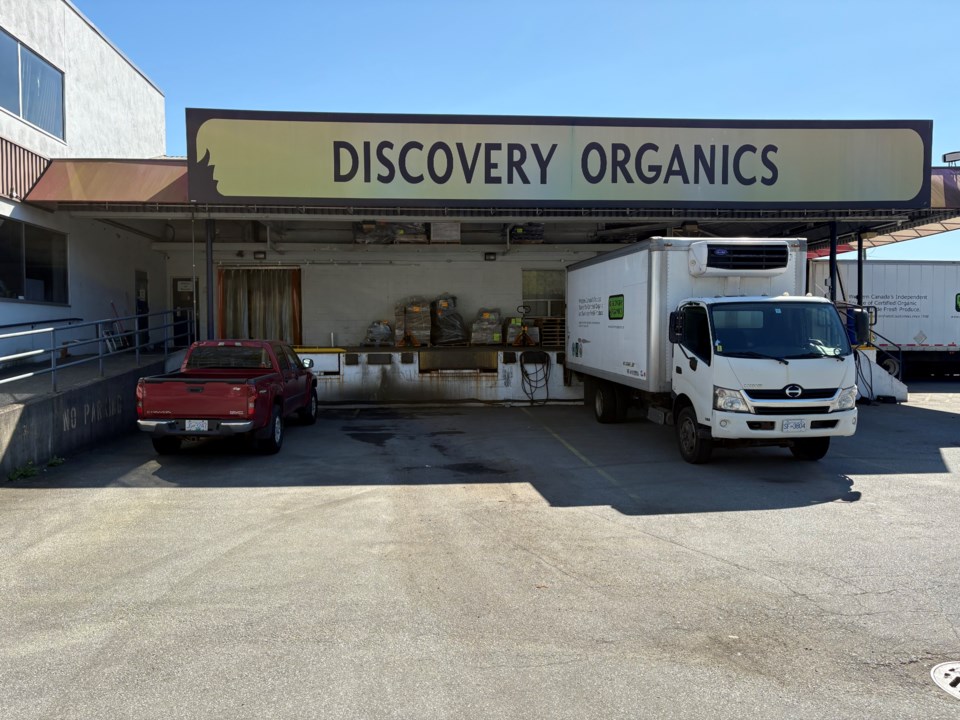One of the largest organic food distributors in the Lower Mainland is leaving Vancouver for Burnaby as development pressure mounts on Produce Row, the heart of Vancouver’s produce distribution network.
Discovery Organics recently purchased a 12,000-square-foot warehouse at 5628 Riverbend Drive in Burnaby and moved its operations there on May 9, leaving behind the 25,161 square feet it had leased on Malkin Avenue since 2015. “Staying on Produce Row was becoming pretty economically unsustainable, just with the rent increases and the development happening around St. Paul’s Hospital,” said Brody Irvine, a co-owner of Discovery Organics.
Discovery Organics says Produce Row, located just east of Main Street and south of Prior Avenue, functions like a neighbourhood and a community where companies work with each other interdependently. “We really do help each other out,” said Irvine. “We have really close ties with all the businesses along this street. It’s kind of sad to leave it,” said Irvine.
The potential routing of a new arterial along Malkin Avenue was an issue local businesses banded together to fight. Malkin Avenue as one of two preferred routes the city identified for a new arterial road to replace Prior and Venables streets following the removal of the Georgia Street viaducts. “The discussion over the years of the viaducts coming down and kind of redeveloping Prior Street really galvanizes us altogether to just to advocate for this space as a food security, an economic hub in Western Canada,” Irvine said.
The cluster of produce businesses make it a linchpin in the local food chain, because trucks can stop at multiple businesses whether they’re delivering produce or collecting product. “The trucks will stop at multiple locations right on the same street, before they hit the road and deliver stuff throughout B.C.,” said Russ Bougie, a principal at real estate services firm Avison Young (Canada) Inc., which is charged with leasing up Discovery Organics’ old space.
Vancouver city Coun. Pete Fry feels that the city would benefit from taking a broader look. “This is a real missed opportunity,” he says. “We should really look for a purpose-built produce terminal that leases out space to different operators so it's one centralized hub, in the interest of food security and resiliency for the City of Vancouver.” Fry said land values tripled between 2015 and 2018, and the construction of the new St. Paul’s Hospital has likely pushed them up even further. He anticipates that the older industrial buildings along Produce Row will start to disappear as land values increase and traffic intensifies.
According to Fry, businesses on Produce Row say it’s difficult for bigger trucks to navigate space as more turning radius is needed and it is not the most efficient land use right now. “The lack of initiative with this council as they are marched into sexy projects like stadiums and amphitheatres and not things like a produce terminal which would take a significant amount of investment involving food distributors,” said Fry.
It is hard to predict the future for Produce Row, but Discovery Organics is pleased with its new premises in an established industrial area near other food distributors. Formerly home to a seafood company, the building is well-equipped with coolers. “In our search for a new location, it was maybe less than five per cent of any warehousing available at any given time had coolers already installed,” Irvine said. “It’s a precious infrastructure to have already in place.”
The company’s old space, owned by grocery giant HY Louie, is enjoying strong interest from prospective tenants, despite the pressures on Produce Row. “We have had a few groups through; two produce distribution groups and one catering company so far that were the most interested, and these groups could use the existing coolers in the building,” Bougie said. “There’s probably $1 million worth of coolers in the facility and so, yeah, there’s an opportunity for a tenant to take advantage of some infrastructure that is already there.”



